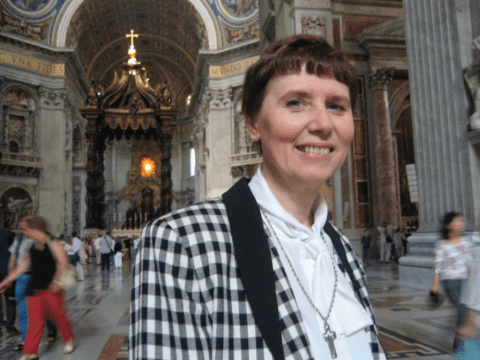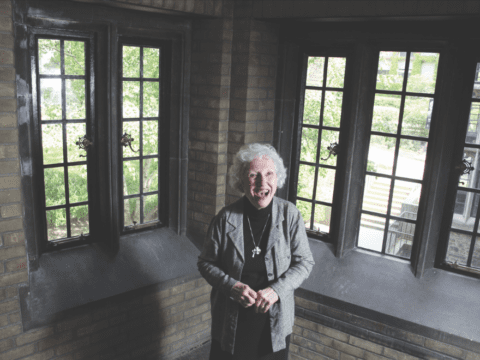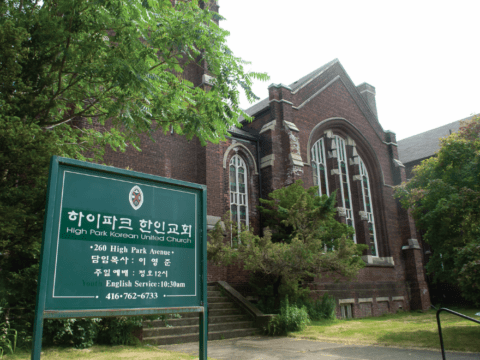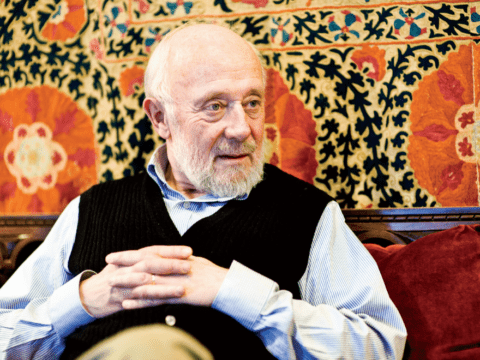Rev. Louise Robson was a commissioner to the 1974 General Council when it voted to unite with the Anglican Church of Canada. She clearly remembers the disappointment when Anglicans decided a year later to turn down the union agreement.
“The Anglicans couldn’t give up their bishops,” she says. For the past decade, however, Robson has been pastor of the Anglican Evesham Community Church, part of the Unity-Meridian Pastoral Charge in northwest Saskatchewan. She’s watching closely as a second round of renewed United-Anglican dialogue continues next month in Vancouver.
Neither Anglicans nor United Church people involved in the talks believe a new attempt at union is in the cards. But as the United Church looks into mutual recognition of ministries — with Anglicans, the Presbyterian Church in Canada, plus three U.S. denominations and global partners in South Korea and the Philippines — it’s clear that a move toward greater ecumenical co-operation is afoot.
Official mutual recognition would allow ministers to move freely across denominational lines. In other words, Presbyterian ministers could be called to serve United churches and vice versa. The same would hold for ministers of the American United Methodist Church or the United Church of Christ in the Philippines, if agreements are reached.
A report to the Executive of General Council earlier this year describes the current state of interchurch co-operation as an “ecumenical winter.” A thaw may be coming. As congregations shrink and mass clergy retirements loom, sharing ministers with other denominations facing similar challenges makes sense. Like many ecumenical actions, however, agreements are often preceded by years of discussions.
The Anglicans already have a full communion agreement with the Evangelical Lutheran Church in Canada. As well as mutual recognition of ministers, such pacts typically include mutual recognition of membership and sacraments, joint celebration of communion and shared understandings of mission.
The first round of renewed Anglican-United talks, from 2003 to 2009, was a chance for the two denominations — especially the United Church, which assumed the role of jilted suitor after the failed union attempt — to patch up relations. The St. Brigid Report emerged from those discussions in 2009, looking at similarities between the denominations and the many shared ministries already in place.
The second round, begun last spring and continuing next month, officially focuses on each church’s doctrinal identity and how it is lived out through sacraments and orders of ministry.
According to Rev. William Harrison, the dialogue’s Anglican co-chair, the group will also look at how the churches could move toward full communion. “If this seems like a possibility, that will be quite exciting,” says Harrison, principal of a school for ministry in Kelowna, B.C. “If it does not, then we will ask what other sorts of future relationships might be productive for our common sense of mission.” Either way, the dialogue will be a bellwether for other interchurch discussions.
Ven. Bruce Myers, the Quebec-based ecumenical co-ordinator with the Anglican Church, says the process seems ponderous, but the Anglicans’ 20-year journey to full communion with Lutherans was “almost breakneck speed considering that these divisions go back centuries.” Discussions help bring out stumbling blocks, he says, but “I’m sure the things we share in common vastly outnumber the things that divide us.”
The United Church co-chair, Rev. Andy O’Neill of St. Paul’s United in Riverview, N.B., wasn’t even born when the Anglican-United Plan of Union foundered in 1975. “There are substantive differences” in theology between the churches, he says, but “we’re there to discuss these things and investigate them. . . . We represent our denominations, but we are not decision-makers; we’re not a task force or commission.”
United Church policy-makers seem to be already anticipating problems that might arise and considering steps that could resolve them. As the Anglican representative at General Council last August, Myers told commissioners he was happy to see the United Church looking into “local ordination” as an option for licensing lay ministers. In the Anglican Church, those in equivalent roles are simply ordained. Opting for a similar solution would move United Church ministry closer to the Anglican model.
Rev. Don Koots, a member of the Anglican-United dialogue group from Edmonton, says the General Council’s recent approval of a motion clarifying United Church theological positions will also help. “We’ve talked more about doctrine in the last year than during my whole ministry,” he says.
The number of shared Anglican-United ministries across Canada is one of the reasons for reigniting dialogue between the two churches.
Rev. Sandra Beardsall, professor of church history and ecumenics at St. Andrew’s College in Saskatoon, says the popularity of shared ministries in all mainline Canadian denominations has been rising steadily during the past decade. The United Church now has about 60, of which 35 involve Anglican congregations.
Statistically, at less than three percent of all United Church pastoral charges, shared ministries are a tiny minority. Still, there’s a clear recognition by both Anglican and United churches that financial realities may pressure more congregations to consider sharing either a building or staff, or both.
Beardsall, part of the Anglican-United dialogue group, adds that “national conversations and local partnerships tend to mutually encourage each other.”
Indeed, many of the current Anglican-United ministries were born in the early 1970s, when union between the denominations seemed imminent. That’s when St. Mary’s Anglican-United came into being in Sorrento, B.C. Its minister, Rev. Bruce Chalmers, says the congregation is “sort of on the fringe of our two denominations,” but this status gives them “a certain freedom.”
The church operates with a “de facto mutual recognition of ministry,” says Chalmers. As an Anglican priest, he has his bishop’s permission to lead United Church worship services. Likewise, when United Church ministers serve the charge, they are permitted to lead worship and provide communion to Anglicans.
“I’m here as the minister, the pastor, the priest,” says Chalmers. “On a day-to-day basis, it really doesn’t matter if I’m Anglican or United.”
Next door to the Unity-Meridian charge near the Saskatchewan-Alberta border, Turtle River Parish is a six-point pastoral charge. Like Sorrento, it was formed in anticipation of church union. Now, the denominational origins of the churches are blurred and the style of worship depends on whether the service is being presided over by Anglican priest Rev. Don Skinner or Rev. Kun Kim of the United Church.
Skinner, who has served the charge for 26 years, says, “There has to be a pretty solid generosity of spirit” for shared ministry to succeed. Regardless of national dialogue or decisions, “in the local community, if people decide to minister together and care for each other, it will work.”
Kim — who joined Skinner in pastoral leadership a year ago — says similarities in leadership style and the ability to work collegially are key. “Shared traditions are important. But relationships are more important.”
If General Council’s initiative for mutual recognition of ministry bears fruit, open-minded United Church congregations could wind up with clergy leadership from a wide variety of reformed church traditions.
General Council general secretary Nora Sanders recently sent out letters inviting several denominations to discuss and consider mutual recognition of ministry: the Presbyterian Church in Canada, Presbyterian Church (U.S.A.), United Church of Christ, United Methodist Church, Presbyterian Church in the Republic of Korea (PROK) and United Church of Christ in the Philippines.
By early fall, PROK had responded positively. Others are likely to follow, kicking off a flurry of ecumenical meetings.
Rev. Karen Georgia Thompson, ecumenical officer of the Cleveland-based United Church of Christ (UCC), said the denomination’s general minister and president, Rev. Geoffrey Black, will respond formally to the invitation. Staff from the United Church and UCC had already begun meeting informally last April to talk about developing a closer relationship. So the invitation was not a complete surprise.
The United Church of Christ currently has full communion agreements with four other U.S. denominations. The cross-border element may add new issues, says Thompson, but “my observation has been that the partnerships tend to work a lot better when the groundwork has been done.”
She adds, “My sense is that we may need a few more ‘get to know you’ meetings before we venture into ‘This is what we are going to do.’”
Meanwhile, shared ministry continues to grow in Saskatchewan. There’s increased interest elsewhere as well, says United Church interchurch and interfaith staff person Gail Allan. “For some people, it’s a vision of a more effective, more exciting way of being in ministry.”
Louise Robson points out that hard circumstances have bred a strong streak of “Prairie practicality,” which helped lead the United Church toward union in 1925. This practical spirit still leads Prairie congregations toward shared ministry. “There’s a good deal of co-operation here,” she says. “It makes sense. You can’t heat a building in the wintertime for six people.”
***
This story first appeared in The United Church Observer’s December 2012 issue with the title “Ecumenical overtures.”














